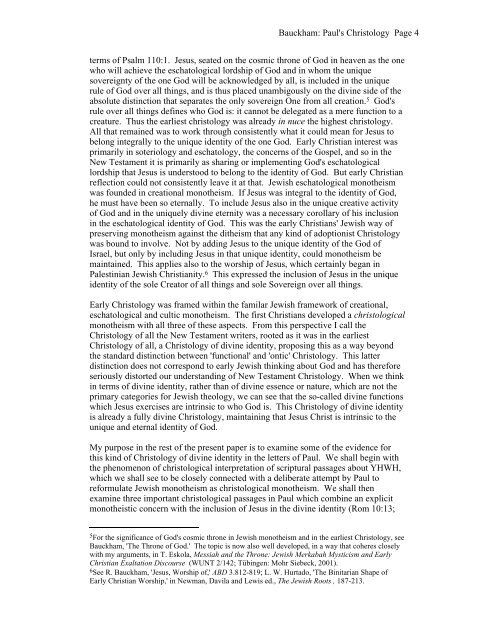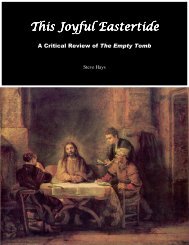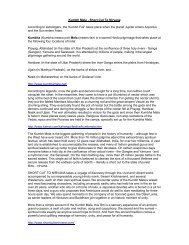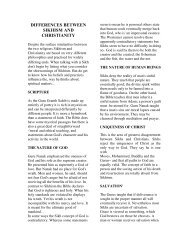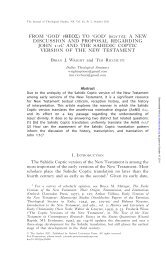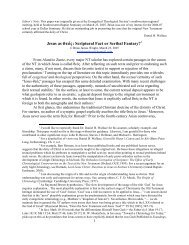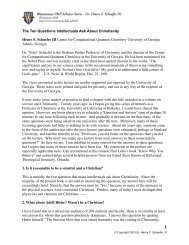Paul's Christology of Divine Identity © Richard ... - For an Answer
Paul's Christology of Divine Identity © Richard ... - For an Answer
Paul's Christology of Divine Identity © Richard ... - For an Answer
You also want an ePaper? Increase the reach of your titles
YUMPU automatically turns print PDFs into web optimized ePapers that Google loves.
Bauckham: <strong>Paul's</strong> <strong>Christology</strong> Page 4<br />
terms <strong>of</strong> Psalm 110:1. Jesus, seated on the cosmic throne <strong>of</strong> God in heaven as the one<br />
who will achieve the eschatological lordship <strong>of</strong> God <strong>an</strong>d in whom the unique<br />
sovereignty <strong>of</strong> the one God will be acknowledged by all, is included in the unique<br />
rule <strong>of</strong> God over all things, <strong>an</strong>d is thus placed unambigously on the divine side <strong>of</strong> the<br />
absolute distinction that separates the only sovereign One from all creation. 5 God's<br />
rule over all things defines who God is: it c<strong>an</strong>not be delegated as a mere function to a<br />
creature. Thus the earliest christology was already in nuce the highest christology.<br />
All that remained was to work through consistently what it could me<strong>an</strong> for Jesus to<br />
belong integrally to the unique identity <strong>of</strong> the one God. Early Christi<strong>an</strong> interest was<br />
primarily in soteriology <strong>an</strong>d eschatology, the concerns <strong>of</strong> the Gospel, <strong>an</strong>d so in the<br />
New Testament it is primarily as sharing or implementing God's eschatological<br />
lordship that Jesus is understood to belong to the identity <strong>of</strong> God. But early Christi<strong>an</strong><br />
reflection could not consistently leave it at that. Jewish eschatological monotheism<br />
was founded in creational monotheism. If Jesus was integral to the identity <strong>of</strong> God,<br />
he must have been so eternally. To include Jesus also in the unique creative activity<br />
<strong>of</strong> God <strong>an</strong>d in the uniquely divine eternity was a necessary corollary <strong>of</strong> his inclusion<br />
in the eschatological identity <strong>of</strong> God. This was the early Christi<strong>an</strong>s' Jewish way <strong>of</strong><br />
preserving monotheism against the ditheism that <strong>an</strong>y kind <strong>of</strong> adoptionist <strong>Christology</strong><br />
was bound to involve. Not by adding Jesus to the unique identity <strong>of</strong> the God <strong>of</strong><br />
Israel, but only by including Jesus in that unique identity, could monotheism be<br />
maintained. This applies also to the worship <strong>of</strong> Jesus, which certainly beg<strong>an</strong> in<br />
Palestini<strong>an</strong> Jewish Christi<strong>an</strong>ity. 6 This expressed the inclusion <strong>of</strong> Jesus in the unique<br />
identity <strong>of</strong> the sole Creator <strong>of</strong> all things <strong>an</strong>d sole Sovereign over all things.<br />
Early <strong>Christology</strong> was framed within the familar Jewish framework <strong>of</strong> creational,<br />
eschatological <strong>an</strong>d cultic monotheism. The first Christi<strong>an</strong>s developed a christological<br />
monotheism with all three <strong>of</strong> these aspects. From this perspective I call the<br />
<strong>Christology</strong> <strong>of</strong> all the New Testament writers, rooted as it was in the earliest<br />
<strong>Christology</strong> <strong>of</strong> all, a <strong>Christology</strong> <strong>of</strong> divine identity, proposing this as a way beyond<br />
the st<strong>an</strong>dard distinction between 'functional' <strong>an</strong>d 'ontic' <strong>Christology</strong>. This latter<br />
distinction does not correspond to early Jewish thinking about God <strong>an</strong>d has therefore<br />
seriously distorted our underst<strong>an</strong>ding <strong>of</strong> New Testament <strong>Christology</strong>. When we think<br />
in terms <strong>of</strong> divine identity, rather th<strong>an</strong> <strong>of</strong> divine essence or nature, which are not the<br />
primary categories for Jewish theology, we c<strong>an</strong> see that the so-called divine functions<br />
which Jesus exercises are intrinsic to who God is. This <strong>Christology</strong> <strong>of</strong> divine identity<br />
is already a fully divine <strong>Christology</strong>, maintaining that Jesus Christ is intrinsic to the<br />
unique <strong>an</strong>d eternal identity <strong>of</strong> God.<br />
My purpose in the rest <strong>of</strong> the present paper is to examine some <strong>of</strong> the evidence for<br />
this kind <strong>of</strong> <strong>Christology</strong> <strong>of</strong> divine identity in the letters <strong>of</strong> Paul. We shall begin with<br />
the phenomenon <strong>of</strong> christological interpretation <strong>of</strong> scriptural passages about YHWH,<br />
which we shall see to be closely connected with a deliberate attempt by Paul to<br />
reformulate Jewish monotheism as christological monotheism. We shall then<br />
examine three import<strong>an</strong>t christological passages in Paul which combine <strong>an</strong> explicit<br />
monotheistic concern with the inclusion <strong>of</strong> Jesus in the divine identity (Rom 10:13;<br />
5 <strong>For</strong> the signific<strong>an</strong>ce <strong>of</strong> God's cosmic throne in Jewish monotheism <strong>an</strong>d in the earliest <strong>Christology</strong>, see<br />
Bauckham, 'The Throne <strong>of</strong> God.' The topic is now also well developed, in a way that coheres closely<br />
with my arguments, in T. Eskola, Messiah <strong>an</strong>d the Throne: Jewish Merkabah Mysticism <strong>an</strong>d Early<br />
Christi<strong>an</strong> Exaltation Discourse (WUNT 2/142; Tübingen: Mohr Siebeck, 2001).<br />
6 See R. Bauckham, 'Jesus, Worship <strong>of</strong>,' ABD 3.812-819; L. W. Hurtado, 'The Binitari<strong>an</strong> Shape <strong>of</strong><br />
Early Christi<strong>an</strong> Worship,' in Newm<strong>an</strong>, Davila <strong>an</strong>d Lewis ed., The Jewish Roots , 187-213.


